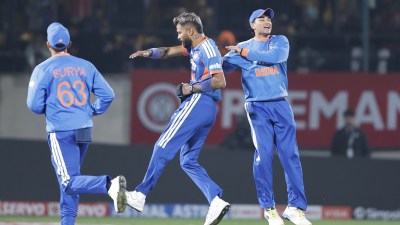The National Eligibility cum Entrance Test (NEET) is held every year for admission to undergraduate medical courses in the country, registration for which is likely to begin in the first week of March, a top NTA official told indianexpress.com.

In 2013, along with English, NEET was conducted in six regional languages – Gujarati, Bengali, Tamil, Marathi, Telugu and Hindi. As in the past years, many states requested the Centre to include the regional language as their students were unable to compete for the national level exams.
A closer look at the four years’ data, as shared by the NTA, highlights a steady increase in NEET UG registration – from 15,97,435 in 2020, 16,14,777 in 2021 to 18,72,343 in 2022. Language-wise, English remains the dominant choice, with Hindi as the second most registered language.
 NEET UG 2023: English is the most opted language. (Source: NTA) Graphic by Abhishek Mitra
NEET UG 2023: English is the most opted language. (Source: NTA) Graphic by Abhishek Mitra
Most striking is the rise of Tamil and Bengali, and the downfall of Marathi, Odia and Gujarati among the NEET test takers.
The registration for Tamil has gone up by 3,043.07 per cent in these four years. Dr Abul Hasan, president of IMA Tamil Nadu (he will take charge in 2024), attributes it to the growing awareness and availability of books in the local languages. “Over a decade back, it was impossible to think that MBBS can be taught in Tamil. However, there are many regional writers who have written medical books and translated them from English to Tamil. Dr Ganesan and Dr Surendran’s books on MBBS are already available online. Tamil University too, has been working to bring the medical studies syllabus to the local languages for the last 20 years. Also, this generation is more optimistic to study higher education in their mother tongue. There are many AI apps that have been developed to ease this transition,” Dr Hasan said.
However, the applications in the Marathi language have seen a massive downfall – from 31,239 students applying in 2019, it has dropped to 2,368 (192.42 per cent). Dr J A Jayalal, ex-National President, IMA believes there is a similarity between Marathi and Hindi, probably which is why students are finding it easy to switch to the latter. “There is a difference between state and central board syllabi. Many NEET aspirants feel that it is better to switch to the central board as unarguably NCERT books are preferred while preparing the NEET paper,” he said.
Story continues below this ad
Parijit Mishra, medical counsellor, Allen Coaching institute, echoes the same. “There are fewer students opting for regional languages as they know higher education is completely in English medium. Many NEET aspirants opt for CBSE to get a strong hold on the exam. Also, the basic knowledge or chapters are the same in all books,” he said, adding that he has not seen any NEET topper coming from state boards.
Kanika Dharme (name changed), a NEET aspirant who has studied in Marathi medium, has decided to register in English as the mode of the exam. “There are fewer books available in Marathi for the NEET preparation. Since we were told that NEET UG’s syllabus is based on NCERT books, I would work hard and appear for the test in English,” she said.
While Dharme rues the lack of study material, other students feel it is easy to switch to English at this stage, since all MBBS books are not available in the regional language.
Rishita Chakraborty completed her high school studies in the Bengali medium. In 2021, she appeared for NEET but failed to crack it. She had to switch to English medium as there were limited preparation books or study materials available in Bengali. “I decided to appear for NEET in English, since I thought it will be simpler to comprehend English terminology than Bengali. Another reason is everything in higher education is taught in English, therefore I decided to opt for the same language in exams so that I can be familiar with the terms and would not encounter any problems later. However, if I had given the exam in the same language, I would have been probably able to attempt it properly,” she said.
Story continues below this ad
Also, while some top publications have books in Hindi, the number of students in other languages makes it unviable, since smaller print runs are difficult. S Chand claims they have 49 titles in six languages, including Hindi, Bengali, Tamil, Telugu, Marathi and Kannada, for all national-level entrance exams. According to them, publishers who provide books for NEET preparation may not have regional language expertise. “The gap can be filled in by publishers who work in the state board market such as Chhaya in West Bengal. This would also enable distribution better since the distributors are not the same for all languages,” said Saurabh Mittal, CFO of S Chand And Company Limited.




 NEET UG 2023: English is the most opted language. (Source: NTA) Graphic by Abhishek Mitra
NEET UG 2023: English is the most opted language. (Source: NTA) Graphic by Abhishek Mitra





























